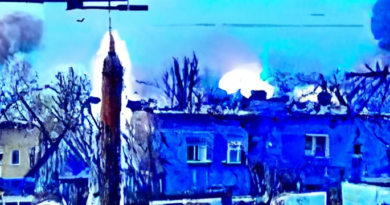QAnon has US security experts worried over potential for violence

WASHINGTON – When Melania Trump released a rare statement on Monday (Jan 11) deploring last week’s storming of the Capitol and naming those who died, she started with Ashli Babbitt, a 41-year-old woman who was shot in the chest and killed by a police officer as she tried to break open a door.
Ms Babbitt was reportedly not only a Donald Trump supporter, but a QAnon adherent.
Separately, a 41-year-old man, one of the first to break into the building and who two days later surrendered to police in his hometown Des Moines, Iowa, wore a QAnon T-shirt at the invasion of the Capitol.
Investigators said he told them he “wanted to have his T-shirt seen on video so that ‘Q’ could ‘get the credit,’” FBI special agent Julie Williams wrote in a statement.
QAnon is a loosely connected, cult-like, rambling network of conspiracy theories. Once delegated to the fringe, it has been veering into the mainstream. At least two QAnon supporters are in Congress: Marjorie Taylor Greene of Georgia and Lauren Boebert of Colorado – who last week threatened to bring her Glock pistol to Congress in violation of District of Columbia (DC) laws.
The ‘Q’ identity belongs to an anonymous online presence who is active on fringe forums, posing as someone with high-end military clearance in the Trump administration. Among other things, QAnon adherents believe in the existence of a deep state cabal of paedophiles and child traffickers led by prominent liberals. And many believe Donald Trump has been divinely sent to save the children.
“QAnon isn’t just a right-wing phenomenon, although it’s disproportionately right-wing because they think that Trump is the saviour, plus he is here to save the children,” says Dr Mia Bloom, terrorism expert and professor of communications and Middle East studies at Georgia State University.
“Donald Trump has been very effective at bringing together a diverse coalition of people, whether they’re anti-government militia… (groups like) Boogaloo, Three Percenters, Oath Keepers, neo-Nazis. The something in common that they found, was a second term for Donald Trump.”
In December 2016, soon after Donald Trump won the election, a 29-year-old North Carolina man drove for several hours all the way to Washington DC and fired a military-style assault rifle inside a pizzeria, wrongly believing he was saving children trapped in a sex-slave ring.
The incident was dubbed “pizzagate”. The man was sentenced to four years in jail.
In July 2020, a man rammed a pickup truck filled with guns through the gates of Canadian Prime Minister Justin Trudeau’s home, then fled on foot with a rifle. Police managed to arrest him. Just 35 minutes before the incident, he had posted on Instagram a conspiracy theory about global elites creating Covid-19 – crediting the unknown “Q”.
The FBI considers QAnon a domestic terrorism threat. At a Congressional hearing last September on threats to the homeland, FBI Director Christopher Wray said the FBI views it as “less of an organisation and more of a complex set of conspiracy theories”.
Many of the acts of violence QAnon has inspired have been perpetrated by women, warned an article last month for NBC News, co-authored by Farah Pandith, adjunct senior fellow at the Council on Foreign Relations (CFR); Jacob Ware, research associate for counterterrorism at the CFR; and Mia Bloom, who is also an international security fellow at New America.
A female QAnon supporter carrying a dozen knives was arrested in May 2020 when she livestreamed a trip to New York City to “take out” then-candidate, now President-elect, Joe Biden. In August, another QAnon-adherent in Texas was charged with aggravated assault after – authorities alleged – she rammed her car into other people she believed were involved in the kidnapping of children.
Ominously, QAnon theories have been flooding right wing circles on the Internet with increasing intensity since the storming of the Capitol.
“The First Lady sort of made an equivalence between the people who were storming the building that got killed and the police officers in the Capitol that were killed,” noted Dr Bloom.
“That creates perverse incentives, because like with any other group, you have people that are kind of delusional, who will convince themselves that it is personally up to them to affect change, which is the explanation for ‘pizzagate’,” Dr Bloom told The Straits Times.
President Donald Trump has also been ambivalent. Asked about QAnon in August 2020, he said “I don’t know much about the movement, other than I understand they like me very much. Which I appreciate”.
“He’s incited them,” contends Dr Colin P. Clarke, Director of Policy and Research at The Soufan Centre, a global security consultancy. “It’s not a dog whistle, it’s a bullhorn.”
The movement has been underestimated because it is easy to be dismissive of the conspiracies it peddles, Dr Clarke told The Straits Times. “But that does not make the threat any less potent. Just because the beliefs are far beyond the pale doesn’t mean they are not capable of violence, they’ve proven it again and again.”
“As dangerous as they are, at least you know what anti-government militias stand for and want. With QAnon, what policies can you possibly implement to assuage their grievances, since what they believe in doesn’t exist?”
*** This article has been archived for your research. The original version from The Straits Times can be found here ***


